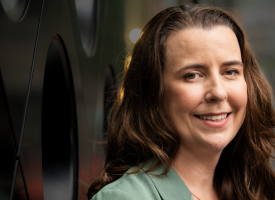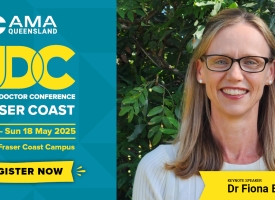AMA President Dr Omar Khorshid on the extension of eligibility for the fourth dose Covid booster
AMA President Dr Omar Khorshid on ABC’s Afternoon Briefing talking about the Covid booster roll-out and flu virus.
GEMMA VENESS: Let's get more on ATAGI's advice now for another 1.5 million people to get a fourth COVID-19 shot. Dr Omar Khorshid is the president of the Australian Medical Association, and he joins me now. Dr Khorshid, thank you. Is the approach of winter a big factor here?
OMAR KHORSHID: Good afternoon, Gemma. Yes, winter is coming. And of course, we're seeing many Australians afflicted with both the flu and with COVID, and it's critical that we do everything possible to minimise the impact of COVID-19 on the vulnerable in the community. So, this decision today extends the eligibility for the fourth dose, or the vaccine or the so-called winter dose, to a much broader group of Australians under the age of 65, recognising that age is still the biggest risk factor for severe disease. But of course, we know that there's many other conditions that have an impact there. And today's decision extends that availability to those people.
GEMMA VENESS: What difference does a fourth shot make?
OMAR KHORSHID: What we're talking about here is increasing the chances of avoiding a hospital admission or a severe illness, or a death from COVID 19. The fourth dose has been shown to do that in an older and sicker group in Israel, and hence it's been available to older Australians for a while now. But this decision extends that, because age isn't the only factor, it is also what chronic diseases you may be living in that are going to have an impact on your experience if you contract COVID-19. Unfortunately, the fourth dose doesn't seem to provide long term prevention against actually catching the virus, and that's why it's not being offered at this stage to healthcare workers, transport workers and other people that may be exposed more. But the good news from the third dose is, of course, that is continuing to provide excellent protection against severe disease for the rest of us in the community.
GEMMA VENESS: So, for those who have had COVID, do they still get the shot? How long do they wait?
OMAR KHORSHID: Yes, it is still recommended to have both a third, and potentially if you're eligible, a fourth dose even if you've had COVID. We know that almost everyone's had their two doses. A lot of Australians have, of course, had COVID since then. And the recommendation is that you wait around three months after you've had COVID before you then have a subsequent vaccination. But it is still recommended to have that vaccination, because it does further boost that immunity, and it provides a different type of immunity to what you get from catching the actual virus. And of course, we are seeing people catching the virus more than once. So, these vaccines are still really important. And there's still six million Australians who are eligible for their third dose who haven't had it yet. So, there's still a long way to go before we can sort of tick off that third dose rollout as being anywhere near as effective as the first two doses.
GEMMA VENESS: What role are antivirals now playing in COVID treatment?
OMAR KHORSHID: So, antivirals are an important adjunct to the vaccines in managing the impact of the virus and trying to reduce the number of people who are getting very sick. They've been shown to be effective. And their use is increasing through the community. It's not perfect yet. We're still seeing quite low numbers of Australians receiving Paxlovid. But Molnupiravir has been out for a while now, and many, many Australians have had access to that drug so far and have hopefully had a much less severe experience of COVID-19 than they would have had without that antiviral.
GEMMA VENESS: Dr Khorshid, you mentioned the influenza earlier as well. How severe is this? Why are we seeing this surge?
OMAR KHORSHID: Well, we do, of course, see influenza every year, and in particular, usually in winter, we get an outbreak. And it varies between years as to the number of people that get infected. And of course, the severity of the virus. The last two years, we've had no flu, and we knew it was going to be a big year when flu got back. And that does appear to be what's happening. We've really quite significant numbers of people testing positive to the flu. Thankfully, mostly younger people who are in a position to cope better with influenza than our older population or young children. And of course, that young population generally haven't had their flu vaccine.
So, there's a really strong message there, I think, for everyone to go and get a flu vaccine. It's relatively cheap if you're not eligible for a free vaccine. And of course, many Australians can access the vaccine completely free by going to their GP, getting a bulk billed visit, and of course, a Commonwealth funded vaccine. And that's a great way to reduce the chances of getting what is a really unpleasant virus that can knock you around really quite significantly. And of course, for some people, you can end up in hospital with influenza.
GEMMA VENESS: And with influenza and COVID cases, how are the health systems coping in all this?
OMAR KHORSHID: Well, our health system is continuing to really struggle. Hospitals are still having very significant problems with access block due to the number of really sick people needing hospital beds, and that's just jamming up the whole system. Now, COVID has made that worse. And of course, a big flu season is the last thing that our hospital emergency departments need. It's the last thing that anyone wants to hear about if they're waiting on an elective surgical waiting list. So, it just goes again to the importance of getting a flu vaccine, getting- keeping yourself up to date with your COVID vaccines, so that you're not adding to the problem. Because really, any Australian who's not vaccinated against these preventable conditions is actually becoming part of the problem in terms of overburdening our health system. And it may mean that your loved one who really needs the system when they have a heart attack or they develop another very serious medical problem, they may not be able to access the care they need because the system has just been so jammed up with people with both flu and COVID.
GEMMA VENESS: Dr Omar Khorshid, thank you.
OMAR KHORSHID: Cheers, Gemma.



